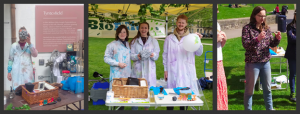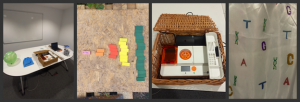As part of City Nature Challenge 2022, a team of PhD candidates at the University of Bristol have led hands-on, family-friendly public engagement activities explaining how the cutting edge science of environmental DNA (eDNA) sequencing can be used to identify local wildlife. DNA sequencing has been taking place in universities and research labs for half a century, but the Bento Lab – a portable, hand-held DNA lab – is allowing citizen scientists to study the DNA of living things around them. The University of Bristol team used a series of escape room-like activities to bring to life the processes involved in using the Bento Lab.

An activity introducing the microscopic world of biology at our fingertips
DNA can be collected from inside an organism’s cells in a process that is a bit like popping a balloon. This was the first task to participants had to do – the balloon had been filled with the letters G, T, C, A to represent DNA – and they then extracted the ‘DNA’ using a pipette. As it is hard to study DNA from so few cells, a polymerase chain reaction (PCR) is used to amplify a particular DNA sequence within the cells. Attendees had to figure out how the PCR process works using coloured dominoes, and all succeeded in understanding that it involves repeatedly doubling the targeted DNA.
This amplified DNA can be selected using gel electrophoresis, which was demonstrated using a noisy rain-stick. The final step is sequencing the DNA, and participants enjoyed donning a cape to give them the ‘superpower’ of being able to read DNA. Since these lab tasks would take hours with the Bento Lab, environmental samples that were brought along were taken away for identification, and attendees will be notified of their species once analysed.

Putting the mobile eDNA lab to the test
Some creatures, such as fungi or microorganisms, can be hard to spot, yet play essential roles in the environment. The next stop for the Bento Lab is to assess fungal diversity at a site of ecological restoration. The Refungium at Coed Talylan in Wales aims to foster the highest diversity of fungi in the UK. The Refungium will be a refuge for native mushrooms, and studying the fungi there with the Bento Lab will inform restoration of this 15-hectare semi-natural woodland.
Would you like to host the eDNA lab?
We welcome opportunities to share this portable workshop, be it at a school, college, university or festival. With activities for all ages, this citizen science experiment has the potential to inspire the next generation of bioscientists and stewards of the environment. As well as learning how eDNA studies work, it opens up conversations about genetics, synthetic biology, ecology, microbiology, sustainability, climate change and responsible research. These themes mesh with the sustainability and climate change strategy recently shared by the UK’s Department for Education. If you would like to host the eDNA lab, please write to us.
Matthew Tarnowski, Claire Noble, Hannah Langlands, Rosie Maddock and Harry Thompson developed this project, which was funded by the EPSRC/BBSRC Centre for Doctoral Training in Synthetic Biology (SynBio CDT) Outreach Award.


1 thought on “Identifying plants and fungi using DNA: citizen science with the Bento Lab”
Comments are closed.